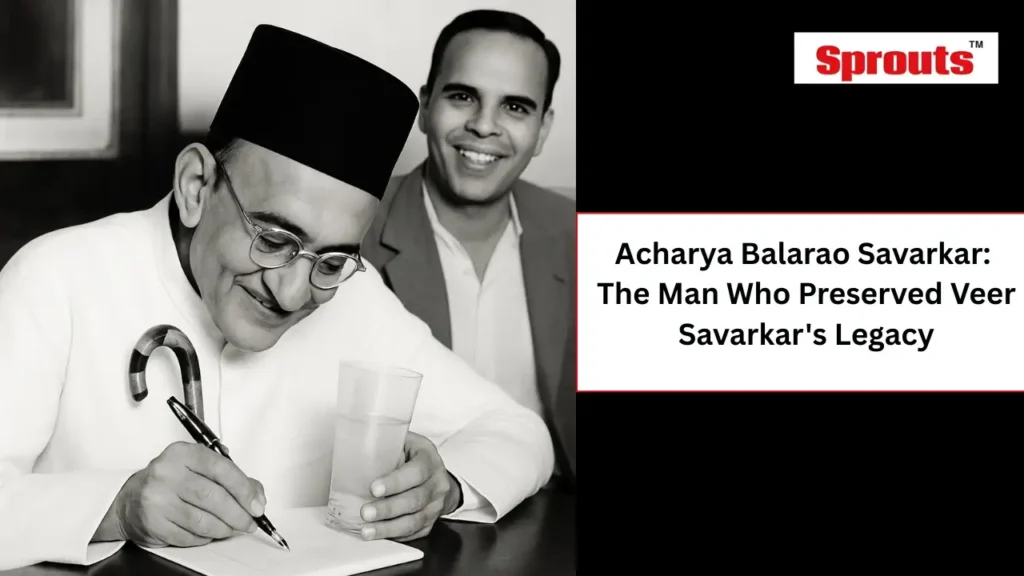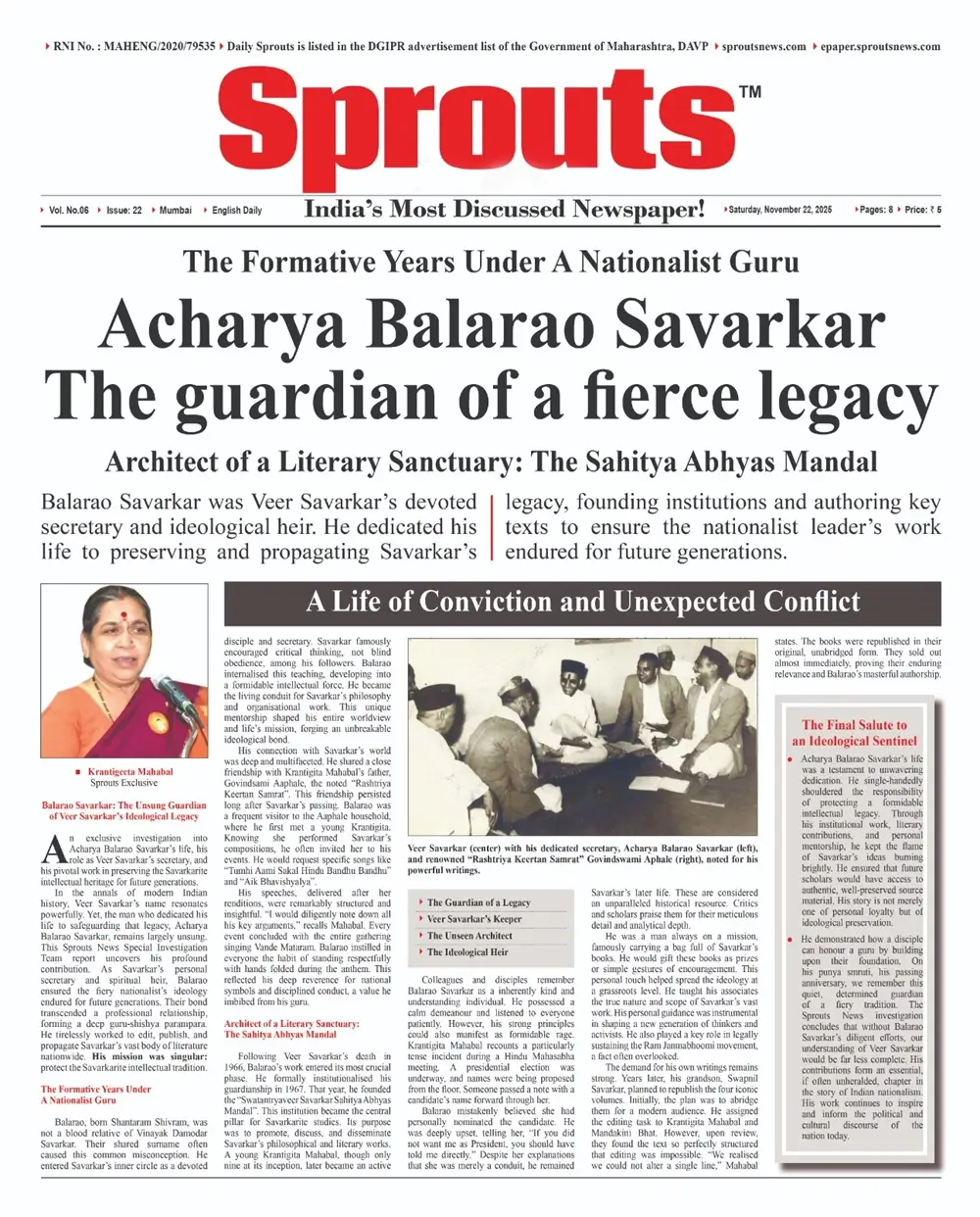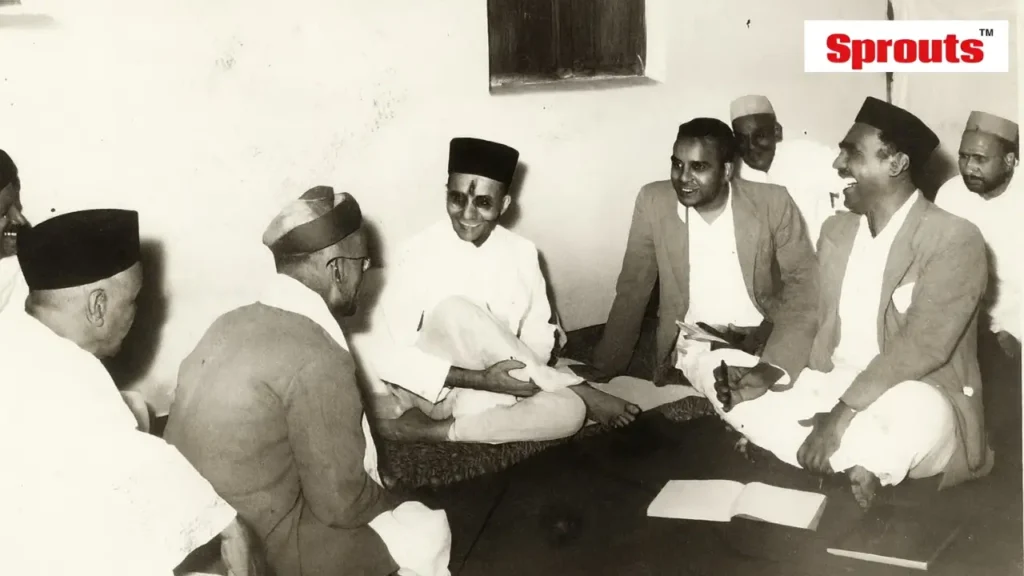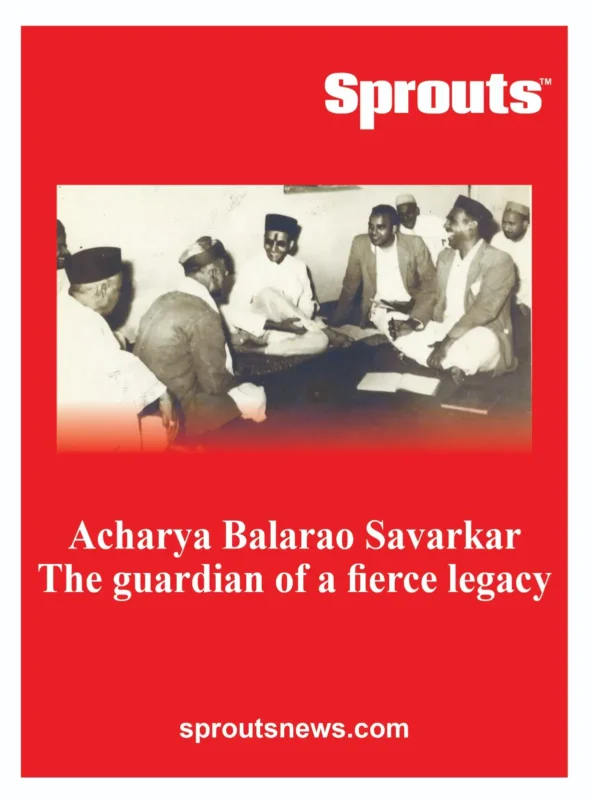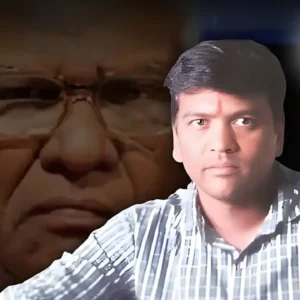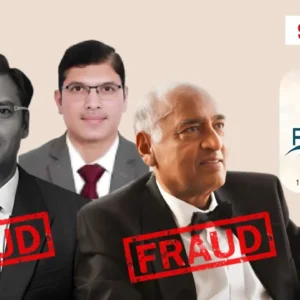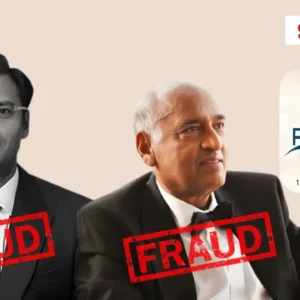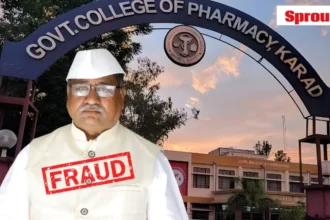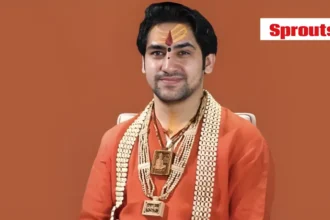Acharya Balarao Savarkar: The Man Who Preserved Veer Savarkar’s Legacy
• The Formative Years Under A Nationalist Guru
• Architect of a Literary Sanctuary: The Sahitya Abhyas Mandal
• A Life of Conviction and Unexpected Conflict
Acharya Balarao Savarkar, Veer Savarkar’s devoted secretary and ideological successor, spent his life safeguarding one of India’s most influential nationalist legacies. As editor, archivist, and cultural guardian, he founded the Sahitya Abhyas Mandal and other institutions to preserve Savarkar’s writings, speeches, and intellectual contributions.
- Acharya Balarao Savarkar: The Man Who Preserved Veer Savarkar’s Legacy
- • The Formative Years Under A Nationalist Guru
- • Architect of a Literary Sanctuary: The Sahitya Abhyas Mandal
- • A Life of Conviction and Unexpected Conflict
- Balarao Savarkar: The Unsung Guardian of Veer Savarkar’s Ideological Legacy
- The Formative Years Under A Nationalist Guru
- Architect of a Literary Sanctuary: The Sahitya Abhyas Mandal
- A Life of Conviction and Unexpected Conflict
- The Indomitable Publisher and His Enduring Literary Legacy
- The Final Salute to an Ideological Sentinel
Click Here To Download the News Attachment
Balarao Savarkar: The Unsung Guardian of Veer Savarkar’s Ideological Legacy
An exclusive investigation into Acharya Balarao Savarkar’s life, his role as Veer Savarkar’s secretary, and his pivotal work in preserving the Savarkarite intellectual heritage for future generations.
In the annals of modern Indian history, Veer Savarkar’s name resonates powerfully. Yet, the man who dedicated his life to safeguarding that legacy, Acharya Balarao Savarkar, remains largely unsung. This Sprouts News Special Investigation Team report uncovers his profound contribution. As Savarkar’s personal secretary and spiritual heir, Balarao ensured the fiery nationalist’s ideology endured for future generations. Their bond transcended a professional relationship, forming a deep guru-shishya parampara. He tirelessly worked to edit, publish, and propagate Savarkar’s vast body of literature nationwide. His mission was singular: protect the Savarkarite intellectual tradition.
The Formative Years Under A Nationalist Guru
Balarao, born Shantaram Shivram, was not a blood relative of Vinayak Damodar Savarkar. Their shared surname often caused this common misconception. He entered Savarkar’s inner circle as a devoted disciple and secretary. Savarkar famously encouraged critical thinking, not blind obedience, among his followers. Balarao internalised this teaching, developing into a formidable intellectual force. He became the living conduit for Savarkar’s philosophy and organisational work. This unique mentorship shaped his entire worldview and life’s mission, forging an unbreakable ideological bond.
His connection with Savarkar’s world was deep and multifaceted. He shared a close friendship with Krantigita Mahabal’s father, Govindsami Aaphale, the noted “Rashtriya Keertan Samrat”. This friendship persisted long after Savarkar’s passing. Balarao was a frequent visitor to the Aaphale household, where he first met a young Krantigita. Knowing she performed Savarkar’s compositions, he often invited her to his events. He would request specific songs like “Tumhi Aami Sakal Hindu Bandhu Bandhu” and “Aik Bhavishyalya”.
His speeches, delivered after her renditions, were remarkably structured and insightful. “I would diligently note down all his key arguments,” recalls Mahabal. Every event concluded with the entire gathering singing Vande Mataram. Balarao instilled in everyone the habit of standing respectfully with hands folded during the anthem. This reflected his deep reverence for national symbols and disciplined conduct, a value he imbibed from his guru.
Also Read: Nashik Jalyukt Shivar Tender Scandal: ₹16 Cr Project Stalled.
Architect of a Literary Sanctuary: The Sahitya Abhyas Mandal
Following Veer Savarkar’s death in 1966, Balarao’s work entered its most crucial phase. He formally institutionalised his guardianship in 1967. That year, he founded the “Swatantryaveer Savarkar Sahitya Abhyas Mandal”. This institution became the central pillar for Savarkarite studies. Its purpose was to promote, discuss, and disseminate Savarkar’s philosophical and literary works. A young Krantigita Mahabal, though only nine at its inception, later became an active organiser.
Under Balarao’s guidance, the Mandal hosted numerous competitions, seminars, and cultural programmes. He was a repository of countless memories, both published and private. “Once he started reminiscing, he would forget all constraints of time,” Mahabal notes. Savarkar had entrusted him with the copyrights to his entire literary corpus. Balarao honoured this immense responsibility by constantly striving to keep all titles in print. He managed the “Veer Savarkar Prakashan” trust to achieve this monumental task.
A Life of Conviction and Unexpected Conflict
Colleagues and disciples remember Balarao Savarkar as a inherently kind and understanding individual. He possessed a calm demeanour and listened to everyone patiently. However, his strong principles could also manifest as formidable rage. Krantigita Mahabal recounts a particularly tense incident during a Hindu Mahasabha meeting. A presidential election was underway, and names were being proposed from the floor. Someone passed a note with a candidate’s name forward through her.
Balarao mistakenly believed she had personally nominated the candidate. He was deeply upset, telling her, “If you did not want me as President, you should have told me directly.” Despite her explanations that she was merely a conduit, he remained unconvinced for a long time. This incident highlights his staunch integrity and aversion to any perceived political manoeuvring. However, once he became President, Mahabal worked alongside him as a Karyavah (executive). She recalls the honour of collaborating with the man who had been Veer Savarkar’s right hand.
The Indomitable Publisher and His Enduring Literary Legacy
Balarao Savarkar was not just a preserver; he was also a prolific creator. His own writing was powerful and precise. He authored several books, ensuring the Savarkarite narrative was continuously enriched. His most celebrated works are the four monumental volumes on Savarkar’s later life. These are considered an unparalleled historical resource. Critics and scholars praise them for their meticulous detail and analytical depth.
He was a man always on a mission, famously carrying a bag full of Savarkar’s books. He would gift these books as prizes or simple gestures of encouragement. This personal touch helped spread the ideology at a grassroots level. He taught his associates the true nature and scope of Savarkar’s vast work. His personal guidance was instrumental in shaping a new generation of thinkers and activists. He also played a key role in legally sustaining the Ram Janmabhoomi movement, a fact often overlooked.
The demand for his own writings remains strong. Years later, his grandson, Swapnil Savarkar, planned to republish the four iconic volumes. Initially, the plan was to abridge them for a modern audience. He assigned the editing task to Krantigita Mahabal and Mandakini Bhat. However, upon review, they found the text so perfectly structured that editing was impossible. “We realised we could not alter a single line,” Mahabal states. The books were republished in their original, unabridged form. They sold out almost immediately, proving their enduring relevance and Balarao’s masterful authorship.
The Final Salute to an Ideological Sentinel
Acharya Balarao Savarkar’s life was a testament to unwavering dedication. He single-handedly shouldered the responsibility of protecting a formidable intellectual legacy. Through his institutional work, literary contributions, and personal mentorship, he kept the flame of Savarkar’s ideas burning brightly. He ensured that future scholars would have access to authentic, well-preserved source material. His story is not merely one of personal loyalty but of ideological preservation.
He demonstrated how a disciple can honour a guru by building upon their foundation. On his punya smruti, his passing anniversary, we remember this quiet, determined guardian of a fiery tradition. The Sprouts News investigation concludes that without Balarao Savarkar’s diligent efforts, our understanding of Veer Savarkar would be far less complete. His contributions form an essential, if often unheralded, chapter in the story of Indian nationalism. His work continues to inspire and inform the political and cultural discourse of the nation today.

